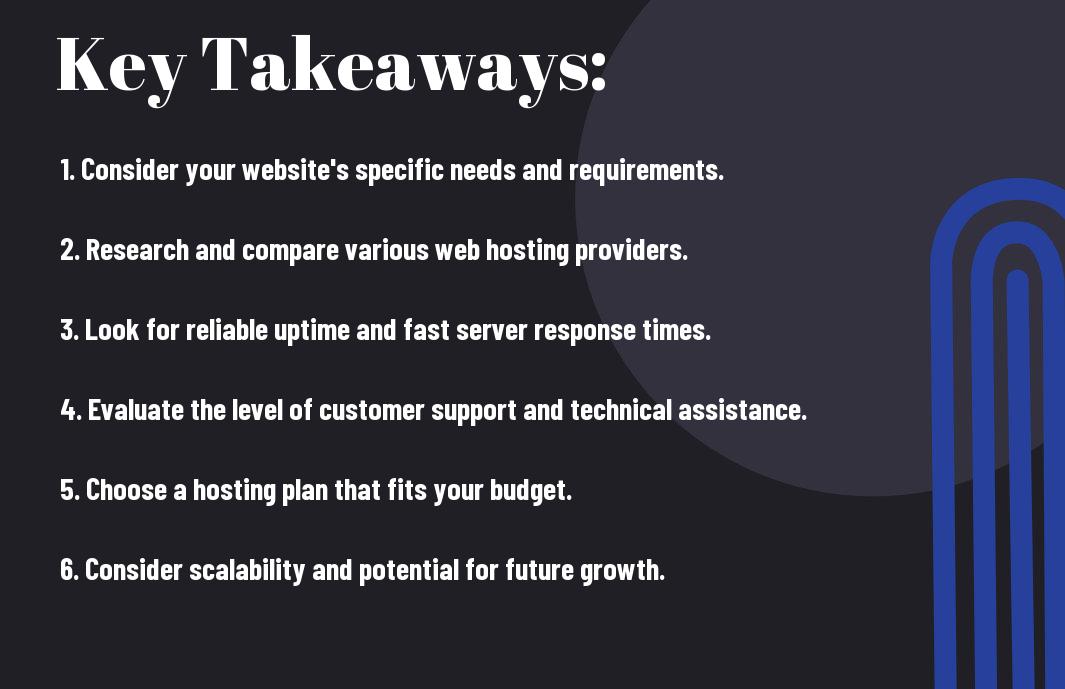When it comes to establishing an online presence, web hosting is a crucial component that can significantly impact your website’s performance. As a website owner, it’s important to understand the different options available to you and how they can benefit your website. Whether you’re a small business owner, a blogger, or an e-commerce entrepreneur, choosing the right web hosting option is essential for ensuring reliability, security, and performance for your website. In this informative blog post, we will delve into the various web hosting options available to you, including shared hosting, VPS hosting, dedicated hosting, and cloud hosting. By the end of this post, you’ll have a clearer understanding of which web hosting option is best suited for your specific needs.
Key Takeaways:
- Consider your website’s specific needs: Before choosing a web hosting option, carefully assess your website’s requirements in terms of traffic, storage, and bandwidth.
- Compare different types of web hosting: From shared hosting to VPS and dedicated hosting, explore the different options available and weigh the pros and cons of each in relation to your website’s needs.
- Look for reliable customer support and uptime guarantees: It’s crucial to select a web hosting provider that offers 24/7 customer support and guarantees a high uptime percentage to ensure your website’s smooth operation.

Shared Web Hosting
While considering web hosting options for your website, shared web hosting is a popular choice for many small businesses and individuals. In this type of hosting, your website is stored on a server that is shared with multiple other websites. This can be a cost-effective option for those who are just starting out or have a smaller budget for hosting.
Pros and Cons of Shared Web Hosting
When it comes to shared web hosting, there are both advantages and drawbacks that you should consider before making a decision. Here are the main pros and cons of shared hosting:
| Pros | Cons |
| Cost-effective | Shared resources can lead to slower performance |
| Easy to set up and manage | Security risks due to sharing server with other websites |
| Technical support is usually included | Limited customization options |
| Good for small websites with low traffic | Less reliable uptime compared to other hosting options |
Best Use Cases for Shared Hosting
If you have a small business website, personal blog, or portfolio site, shared hosting can be a suitable option for you. It’s also a good choice if you are new to website hosting and want a simple and cost-effective solution. However, if you expect high traffic or need more control over your server environment, you may want to consider other hosting options.
Virtual Private Server (VPS) Hosting
Despite the increasing popularity of cloud hosting, virtual private server (VPS) hosting remains a reliable and flexible option for website owners. With VPS hosting, you have your own private virtual server that is separate from other users on the same physical hardware. This allows you to have more control over your server settings and resources, making it a popular choice for businesses and high-traffic websites.
Understanding VPS Hosting
With VPS hosting, your website is hosted on a virtual private server, which mimics dedicated server environments while still sharing the physical server with other VPS users. This means that you have the ability to customize your server settings, install your own software, and allocate resources as needed. VPS hosting provides you with a higher level of control, security, and performance compared to shared hosting.
Comparing VPS to Shared and Dedicated Hosting
When comparing VPS hosting to shared and dedicated hosting, there are several key factors to consider. Below is a comparison table to help you understand the differences:
| Factor | VPS Hosting |
| Resources | You have dedicated resources allocated to your virtual server, providing better performance. |
| Control | You have full control over server settings and can install custom software. |
| Cost | More expensive than shared hosting, but more affordable than dedicated hosting. |
| Security | You have your own isolated environment, which enhances security compared to shared hosting. |
Dedicated Server Hosting
Keep in mind that dedicated server hosting is a type of web hosting arrangement in which you have an entire server entirely for yourself. This means that you are not sharing resources with other websites, which can significantly improve the performance, security, and reliability of your website. If you want to learn more about web hosting options, you can check out this blog post Exploring the Top Domains Hosting Services for Your Website.
Benefits of Choosing Dedicated Server Hosting
The most important benefit of choosing dedicated server hosting is that you have full control over the server, allowing you to customize it according to your specific needs. You also have access to all of the server’s resources, which means that your website can handle large amounts of traffic and data without any performance issues. Additionally, dedicated servers offer enhanced security features to protect your website and customer data from potential cyber threats. This level of control and security is essential for websites that handle sensitive information or have high traffic volumes.
When to Upgrade to a Dedicated Server
If you find that your website is experiencing slow loading times, frequent downtime, or security vulnerabilities, it might be time to upgrade to a dedicated server. Additionally, if your website is growing rapidly and experiencing a significant increase in traffic, a dedicated server can provide the resources needed to accommodate this growth while maintaining optimal performance. Upgrading to a dedicated server can also be crucial if your website handles sensitive data, as the enhanced security measures can help protect against potential cyber threats.
Cloud Hosting Solutions
To ensure the success of your website, you may want to consider cloud hosting solutions. Cloud hosting offers numerous benefits, including scalability, cost-efficiency, and performance. With the flexibility and power of cloud hosting, you can enjoy high levels of reliability and security for your website.
Exploring the Scalability of Cloud Hosting
When considering cloud hosting solutions for your website, scalability is a crucial factor to evaluate. With cloud hosting, you have the ability to easily scale up or down your resources based on your website’s traffic and demands. This means you can accommodate surges in traffic and high-performance requirements without experiencing downtime or service interruptions. The scalability of cloud hosting also allows you to pay only for the resources you need, making it a cost-effective solution for managing unpredictable levels of traffic.
Cost-Efficiency and Performance Considerations
Cloud hosting solutions offer cost-efficiency and high performance for your website. The pay-as-you-go pricing model of cloud hosting allows you to minimize your operational costs by only paying for the resources you use. This can be particularly advantageous for startups and small businesses with limited budgets. Additionally, the performance of cloud hosting is noteworthy, as it provides rapid deployment of resources and enhanced reliability. As your website grows, you can easily scale your resources to meet the increasing demands, ensuring that your website performs optimally at all times.
Specialty Hosting and Emerging Technologies
Now, let’s delve into the world of specialty hosting and emerging technologies. This category of web hosting options encompasses a range of niche services that cater to specific website needs and utilize emerging technologies to deliver high performance and specialized features.
Managed WordPress Hosting and Other Niche Options
When it comes to specialty hosting, managed WordPress hosting is a prime example. This type of hosting is designed specifically for WordPress websites, offering optimized performance, automatic updates, and robust security features. If your website is built on the WordPress platform, you may find that managed WordPress hosting provides the level of support and customization you need to ensure your site runs smoothly and securely. In addition to managed WordPress hosting, there are other niche options available, such as e-commerce hosting, dedicated server hosting, and cloud hosting, each tailored to specific website requirements.
The Impact of New Technologies on Web Hosting Choices
The rapid pace of technological advancement has significantly impacted web hosting choices in recent years. Innovations such as cloud computing, edge computing, and containerization have revolutionized the way websites are hosted and managed. You now have access to scalable and flexible hosting solutions that can accommodate dynamic traffic patterns and resource-intensive applications. However, it’s important to stay informed about the potential risks and vulnerabilities associated with these emerging technologies, as well as the positive impact they can have on your website’s performance and reliability.

Making Your Decision
After Understanding The Different Types Of Web Hosting Services, it’s time to make a decision on which web hosting option is best for your website. With a variety of choices available, it’s important to consider your specific needs and what features are most important to you. Let’s explore the key factors to consider when making your decision.
Assessing Your Website’s Needs
When assessing your website’s needs, it’s important to consider the size and purpose of your site. If you anticipate a high volume of traffic or if you have resource-intensive applications, you may need a hosting solution that can accommodate these demands. On the other hand, if you’re running a small personal blog or portfolio, you may require less robust hosting. Consider what bandwidth, storage, and processing power your website needs to function optimally.
Important Features to Look For in a Web Host
When choosing a web host, there are several key features to consider. Reliability and uptime are crucial, as you want your website to be accessible to visitors at all times. Additionally, you should look for a hosting provider that offers good customer support in case you encounter any issues. Other factors to consider include security measures, scalability options, and pricing. It’s essential to choose a web host that can accommodate your website’s growth and provide the necessary level of security.
Exploring Different Web Hosting Options for Your Website
Taking this into account, it is important for you to carefully consider the different web hosting options available to ensure that your website runs smoothly and securely. Whether you are a small business owner, a blogger, or an e-commerce entrepreneur, choosing the right web hosting service is crucial for the success of your online presence. By understanding your specific needs and researching the features and benefits of different hosting providers, you can make an informed decision that aligns with your goals and budget. From shared hosting to VPS and dedicated servers, there are various options to suit your individual requirements. Ultimately, investing time and effort in exploring these different web hosting options will lead to a more efficient and reliable online platform for you and your audience.
FAQ
Q: What are the different types of web hosting options available for a website?
A: The different types of web hosting options include Shared Hosting, VPS (Virtual Private Server) Hosting, Dedicated Server Hosting, Cloud Hosting, and Managed WordPress Hosting.
Q: What is Shared Hosting?
A: Shared Hosting involves multiple websites sharing a single server. It is a cost-effective option for small businesses and individuals, but it may result in slower performance during high traffic periods.
Q: What is VPS (Virtual Private Server) Hosting?
A: VPS Hosting provides a virtual server within a physical server, offering more resources and control compared to Shared Hosting. It is suitable for medium-sized businesses and growing websites that need scalability and reliability.
Q: What is Dedicated Server Hosting?
A: Dedicated Server Hosting involves renting an entire server for your website. This option provides maximum control, customization, and performance, making it ideal for large businesses with high traffic and resource-intensive websites.
Q: What is Cloud Hosting?
A: Cloud Hosting utilizes a network of virtual servers to provide resources on demand. It offers scalability, flexibility, and high reliability, making it suitable for websites with fluctuating traffic and resource needs.
CATEGORY:Web Hosting

